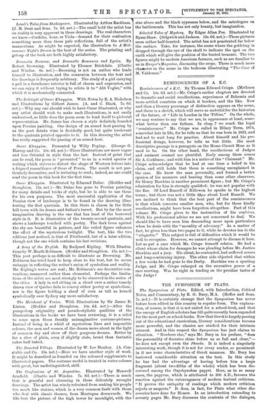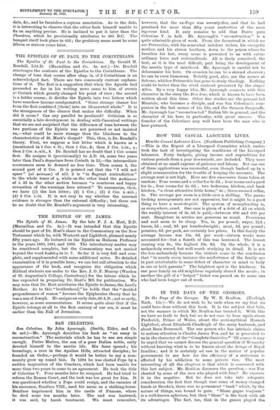THE SYMPOSIUM OF PLATO.
The Symposium of Plato. Edited, with Introduction, Critical Notes, and Commentary, by R. G. Bury, M.A. (Heifer and Sons. 7s. net.)—It is certainly strange that the Symposium has never before been edited in this country in regular form. The explana- tion, of course, is that it is not suited for a school-book, and that the energy of English scholars has till quite recently been expended for the most part on school-books. Now that Greek is largely passing out of the educational curriculum, literary considerations become more powerful, and the classics are studied for their intrinsic interest. And in this respect the Symposium has just claims to attention. "Nowhere else," says Mr. Bury in his preface, "does the personality of Socrates shine before us so full and clear,"— he does not except even the Phaedo. It is indeed a singularly interesting work, though it is not for every reader, so prominent in it are some characteristics of Greek manners. Mr. Bury has bestowed considerable attention on the text. In this study he has had the advantage of having before him a large fragment (about two-fifths of the whole) which has been dis- covered among the Oxyrhynchus papyri. Here, as in so many cases, the papyrus, which is attributed to 200 A.D., favours the reaction against the extravagances of modern textual criticism. "It proves the antiquity of readings which modern criticism rejects or suspects." It does, in fact, for Plato what other dis- coveries have done for Homer. In an introduction extending to seventy pages Mr. Bury discusses the contents of the dialogue,
date, &c., and he furnishes a copious annotation. As to the date, it is interesting to observe that the editor feels himself unable to fix on anything precise. He is inclined to put it later than the Phaedrus, which he provisionally attributes to 385 B.C. The banquet itself took place in 416; the prefatory scene must be some fifteen or sixteen years later.























































 Previous page
Previous page